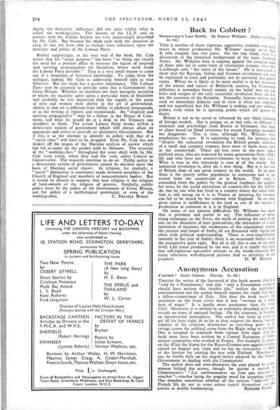Back to Cobbett ?
THIS is another of those vigorous, aggressive, readable and useful tracts in whose production Mr. Williams' energy never flags. It falls roughly into two parts. On the one hand, there is a discussion of the historical background of the main dictatorial States. Mr. Williams here is arguing against the resigned views of those who see in some form of totalitarian tyranny what Mrs. Lindbergh calls " the wave of the future." He is concerned to show that the Russian, Italian and German revolutions can each be explained in local and particular, not in universal and general terms. Where he is likely to be most useful is in his discussion of the nature and causes of Bolshevik success, for Communist influence is nowadays based mainly on the belief that the true heirs and assigns of the only successful revolution from the Left are the courtiers of the Kremlin. Naturally, history written with such an immediate didactic end in view is often too simplified and too superficial, but Mr. Williams is making real not debating points, even when he is ignoring points which tell against his thesis.
Britain-is not to be saved or reformed by any blind following of foreign models. She is unique or, at any rate, so different in structure and psychology from Russia or Germany, that maps or plans based on blind reverence for recent European precedent are dangerous. This is true, although Mr. Williams over- emphasises his case. It is surprising to read, for instance, that "despite the industrial -revolution the British people, inheritors of a small and compact country, have most of them many roots in the countryside. There are few, even in the most indus- trialised areas, who are removed by many generations from village- life and who have not country-relations to keep the link alive." What is true in this statement is true of all the world. The industrial revolution is, after all, a new thing. But it is less true of Britain than of any great country in the world. In no great State is the purely urban population so numerous and so up- rooted from the countryside as in Britain. This truth is concealed from the public by the general fondness for gardens, for trees, by the social attractions of country-life for the well-to- do, but no one who has lived in a country where the rural tradi- tion is still strong (as it is in France or America, for instance) can fail to be struck by the contrast with England. In no other great nation is indifference to the land as one df the factors of production as common as it is in England.
On many of our present difficulties Mr. Williams has much that is pertinent and useful to say. The influence of adver- tising technique on the Press; the myth of putting the cost of the war on the shoulders of later generations; the attractions of a rigid limitation of incomes; the weaknesses of the educational system; the present and future of India; all are discussed with vigour and often with political understanding. There is over-simplification (notably in the case of India); there is an occasional failure to get the perspective quite right. But all in all, this is one of the most lively Left tracts produced by the war, and it is totally free from that self-righteous nut-cutlet attitude to the world-situation that many otherwise well-disposed persons find so irritating in our






































 Previous page
Previous page